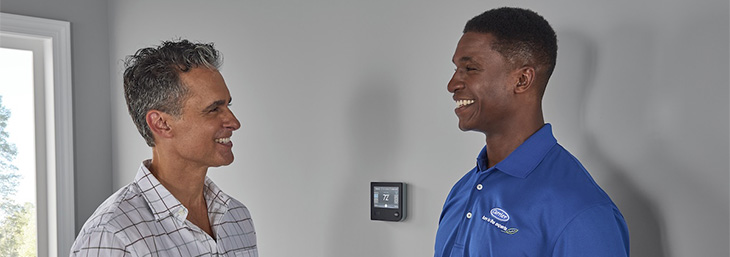
Posted: August 11, 2025 at 9:25 am
By: Lakes Region HVAC
Many home appliances run reliably until the day they finally just give out. With air conditioning systems, though, knowing when to retire them isn’t always so clear. Just because your AC is still “working” doesn’t mean holding onto it is the smartest financial choice. Systems can last a long time, but that longevity makes it tricky to know when replacement is best.
So, how do you know it’s truly time to upgrade? Should you wait for efficiency to dip? How many repairs are too many? Below, we’ll walk through the key signs it’s time for a new system, the benefits of upgrading, and what to consider when choosing your next cooling system.
Even with excellent maintenance, every AC unit has a lifespan. Most last 10–20 years, depending on the model and care. If yours is nearing or past that window, it’s wise to start planning ahead.
A major red flag is if your unit still uses Freon (R-22). Since it has been phased out for environmental reasons, it’s increasingly expensive—and sometimes impossible—to service these systems.
Even if your system isn’t outdated or using banned refrigerants, an aging AC becomes less energy-efficient, which shows up as higher utility bills. Repairs also become more frequent. Planning for replacement before a breakdown can save money and avoid stress during peak summer heat.

As systems age, efficiency declines. Seasonal changes or weather fluctuations can affect your bill, but if you notice a steady increase with no clear cause, your AC may be the culprit.
Before jumping to replacement, rule out other issues like a faulty thermostat. If your technician confirms the system is the problem, upgrading to an ENERGY STAR®-certified unit paired with a smart thermostat can dramatically reduce energy use.
Uneven temperatures—some rooms hot, others cool—signal problems with your system. While causes vary, it’s always worth a technician’s inspection. Left unresolved, inconsistent cooling strains your system and makes your home uncomfortable.

Every system needs the occasional repair, but constant service calls are a warning sign. If you are calling more than once or twice a season, replacement is usually the better investment.
Rule of thumb: If repair costs add up to 50% or more of the price of a new unit, replacement may make more financial sense. A new system also spares you the risk of losing cooling on the hottest summer days.

Your AC doesn’t just cool your home—it filters and circulates air. Signs that your unit may be struggling include:
Modern systems offer advanced air purification and humidity control, making them healthier and more comfortable.
Important: Never ignore unusual smells. Burning odors can indicate electrical danger, while musty smells may signal mold. Both need immediate attention.

Most AC systems blend into the background with a gentle hum. If you hear banging, squealing, rattling, or grinding, something’s wrong. These noises often mean loose or damaged internal parts that need prompt repair—or replacement.
If you’ve added square footage—such as finishing an attic, basement, or building an addition—your system may no longer be properly sized. An undersized AC works harder, wears out faster, and leaves your home uncomfortable.
Not ready for a full replacement? Ductless mini-splits can be an excellent solution for cooling new or challenging spaces without overburdening your main system.
If you’ve decided it’s time to replace your AC, here are smart steps to take:
If this article is useful to you, or if you know someone who can benefit from it, please Share it.
Have another question? Contact the Lakes Region team, and we’ll find your solution.
Our clients are homeowners, small business owners, and corporations—and one could be you by calling 603-286-2290 or emailing info@lrhvac.com.
Lakes Region’s expert service technicians and installers are trained in the latest advancements in heating and cooling technologies. We'll help you select the correct comfort system for your home, ensuring that your equipment operates at the highest efficiency — giving you the lowest monthly operating cost.
Visit our website.
LRHVAC’s office hours: Monday - Friday
7:30-4:30
Phone: 603-286-2290
Mail: 86 Bay Hill Rd., Northfield, NH 03276
Email:
Email us